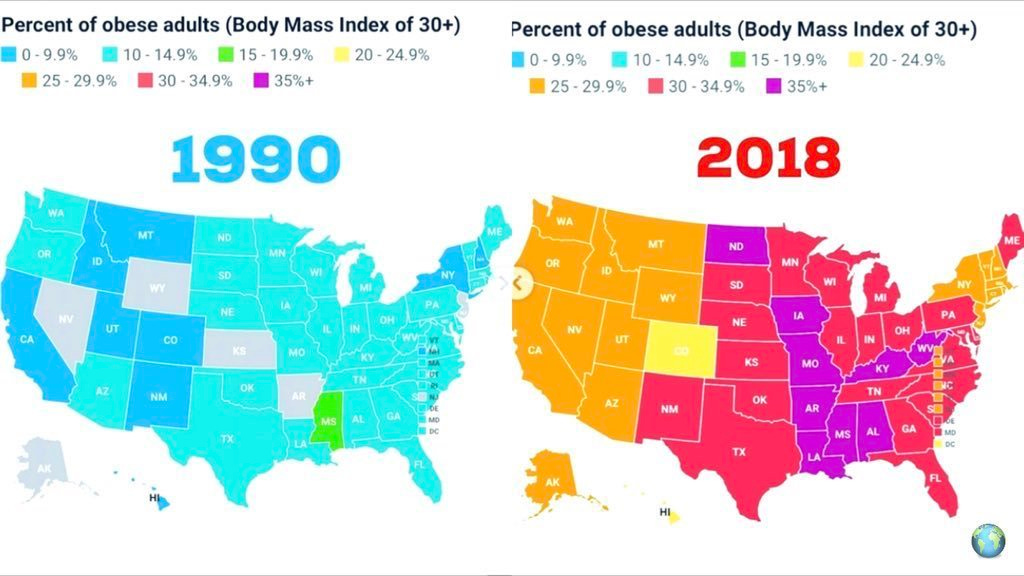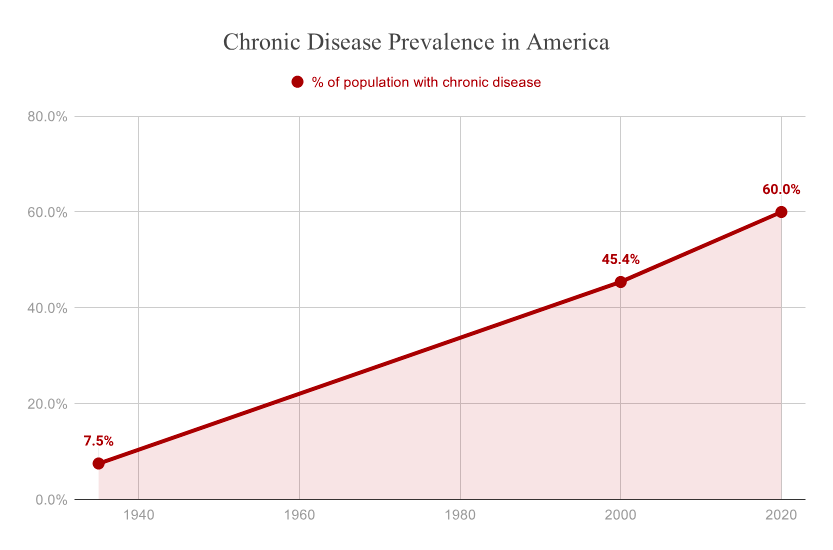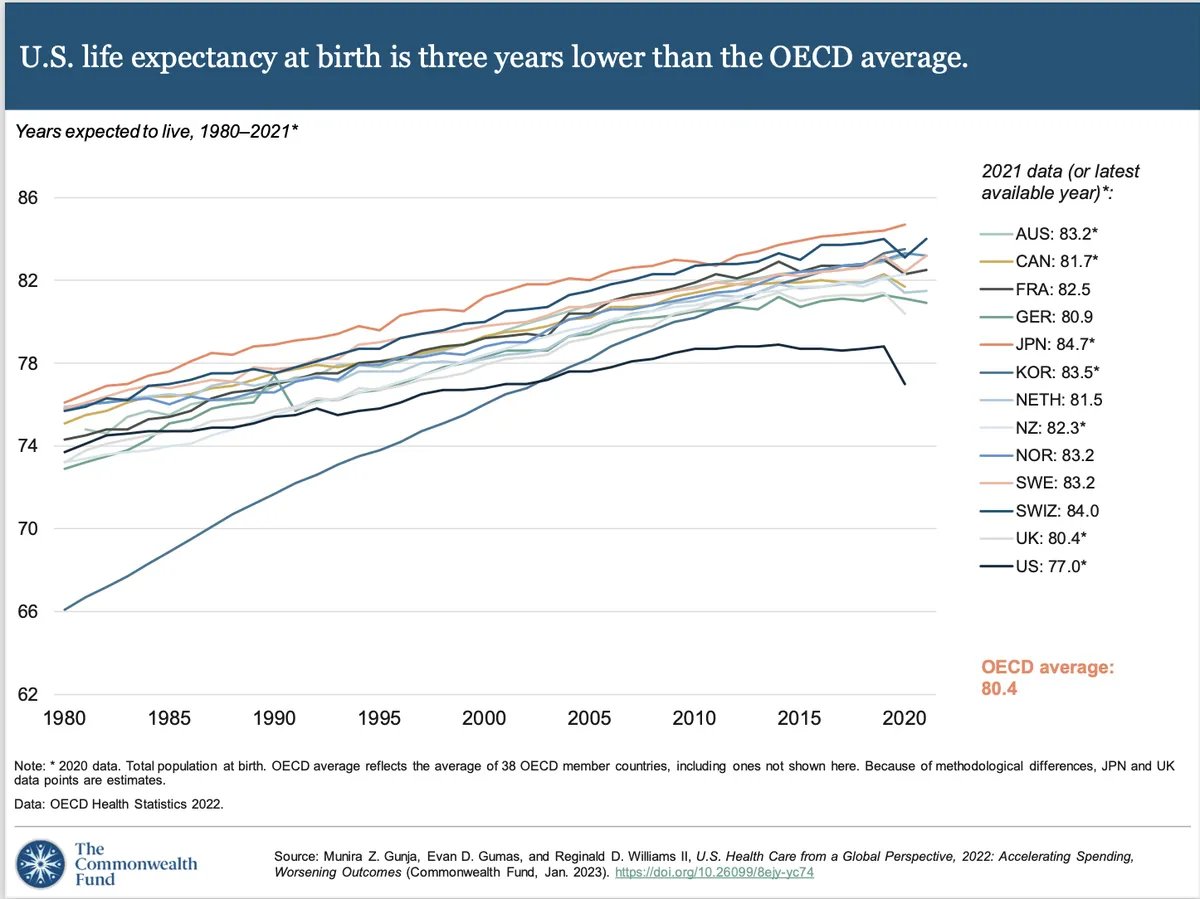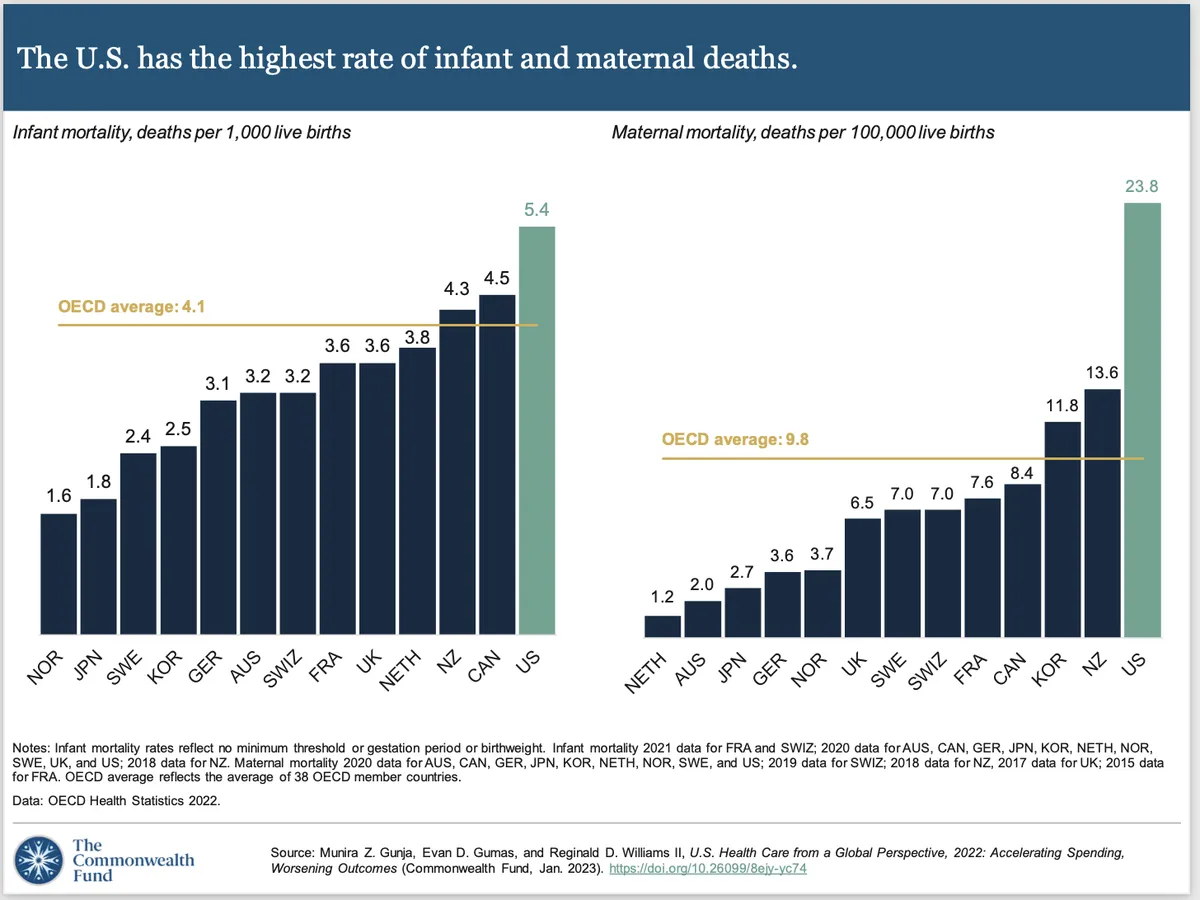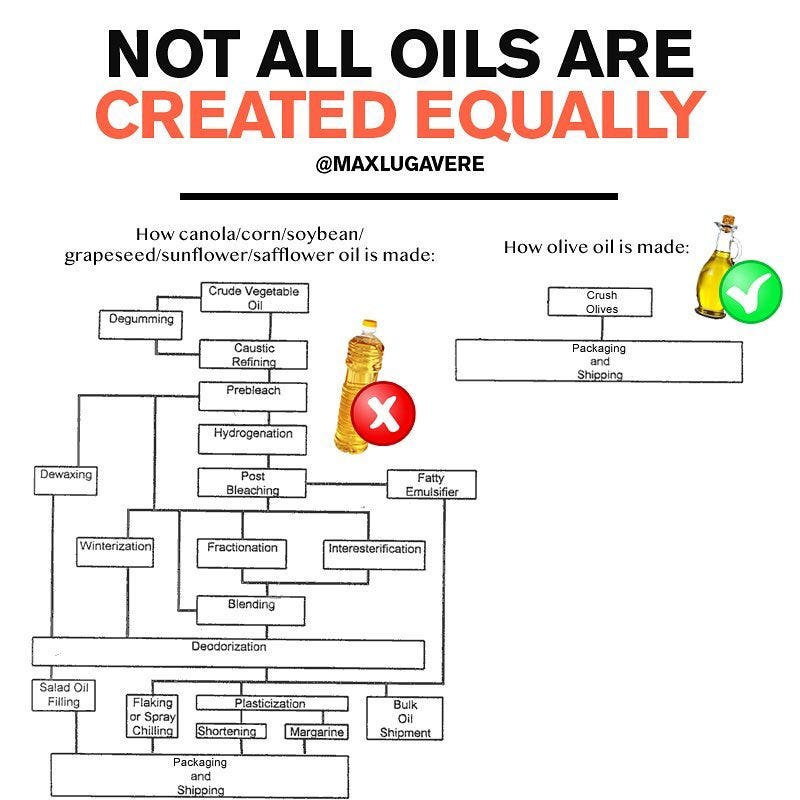🥖 Salve Lucrum: Big Food's Poisoning of America (Part 1)
In the mosaic floor of the opulent atrium of a house excavated at Pompeii is a slogan ironic for being buried under 16 feet of volcanic ash: 'Salve Lucrum', it reads, “Hail, Profit.” That mosaic would be a fitting decoration today in many of health care’s atria.
-Donald M. Berwick, MD
For millions of years, survival was a brutal and relentlessly unforgiving struggle for both humans and animals. But as Homo sapiens evolved, we shattered nature’s constraints — building tools, harnessing fire, and reshaping the world to serve our needs. Life expectancy soared, we eradicated plagues that once ravaged entire populations, we ventured beyond our planet to explore the vast reaches of space. By any reckoning, the story of humanity is one of extraordinary triumph.
Yet, buried inside this triumph lies a bitter irony. The tools and technologies that liberated us from ancient threats have now bound us to new ones. In the animal kingdom, health remains the default. Wild creatures are not plagued by obesity, diabetes, or autoimmune disorders. Instincts guide them to balance. But for humans, that balance has been lost, drowning us in sickness, exhaustion, and despair.
America, in particular, is sicker, fatter, and more miserable than ever. Obesity, diabetes, cancer, heart disease, and mental health disorders are surging, especially among children — a direct result of the profit-seeking grip of corporate interests on our lives.
The industries we once trusted to safeguard our health have instead commodified it, profiting from our addiction to convenience, disregard for long-term consequences, and willingness to trade vitality for quick fixes. These systems have spread illness, hollowed out trust, and built an economy that thrives on our suffering. Recognizing this betrayal is the first step toward reclaiming our well-being — and our future.
Part I: America's Health Crisis by the Numbers
America is facing a health catastrophe of epic proportions — one that our fantastic wealth, entrepreneurial mindset, and innovative medical advancements have failed to stop. Despite spending more on healthcare than any other industrialized nation on earth, we are losing the battle against chronic illness, obesity, and preventable disease. Life expectancy is declining. Healthcare costs have ballooned beyond sustainability, and behind these grim statistics are millions of lives shortened, families broken, and communities on the brink.
To understand the scope of this crisis, let's take a closer look at just some of the numbers behind America's unraveling health.
Obesity
In 1990, not a single U.S. state had an obesity rate over 20%; just thirty years later, every one of the 50 states now exceeds that mark. This staggering, once unthinkable shift in American health has left nearly 50% of Americans obese, fueling a surge of disease and placing a crushing strain on our healthcare system.
The U.S. has the highest obesity rate among the 38 member nations of the Organization for Economic Cooperation and Development (OECD) — nearly double the average rate of all other member nations.
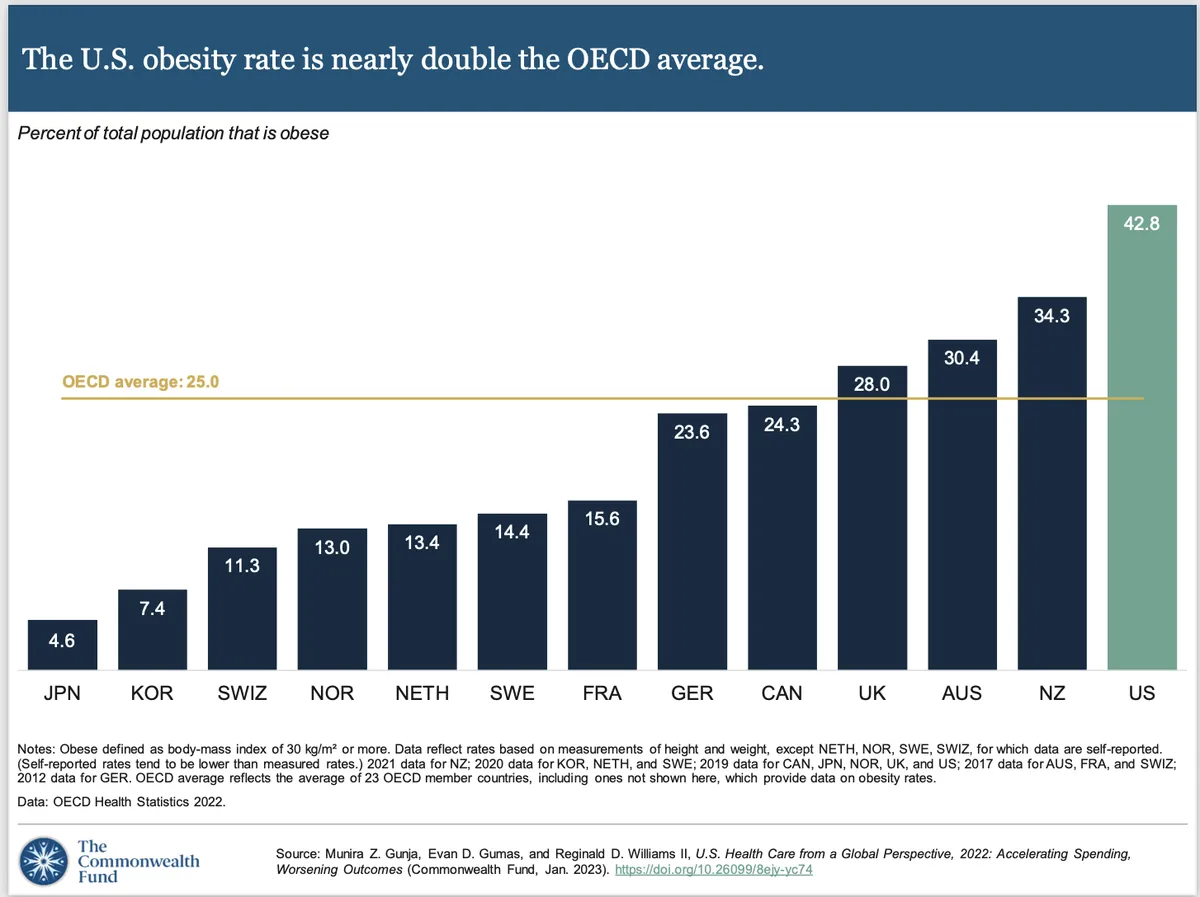 Source: Commonwealth Fund U.S. Health Global Perspective
Source: Commonwealth Fund U.S. Health Global Perspective
Chronic Illness
Chronic illnesses like heart disease, diabetes, and cancer have surged by 700% over the past century, transforming once-rare conditions into a widespread epidemic.
- 6 in 10 adults live with at least one chronic condition; 42% have more than one;
- 7 of every 10 deaths in the U.S. result from chronic diseases which claim over 1.7 million lives annually; and
- Only 12% of American adults are metabolically healthy, free of dangerous levels of blood sugar, blood pressure, cholesterol, and body fat.
Avoidable deaths per 100,000 people in the U.S. outpace those of every other OECD country, far exceeding the average.
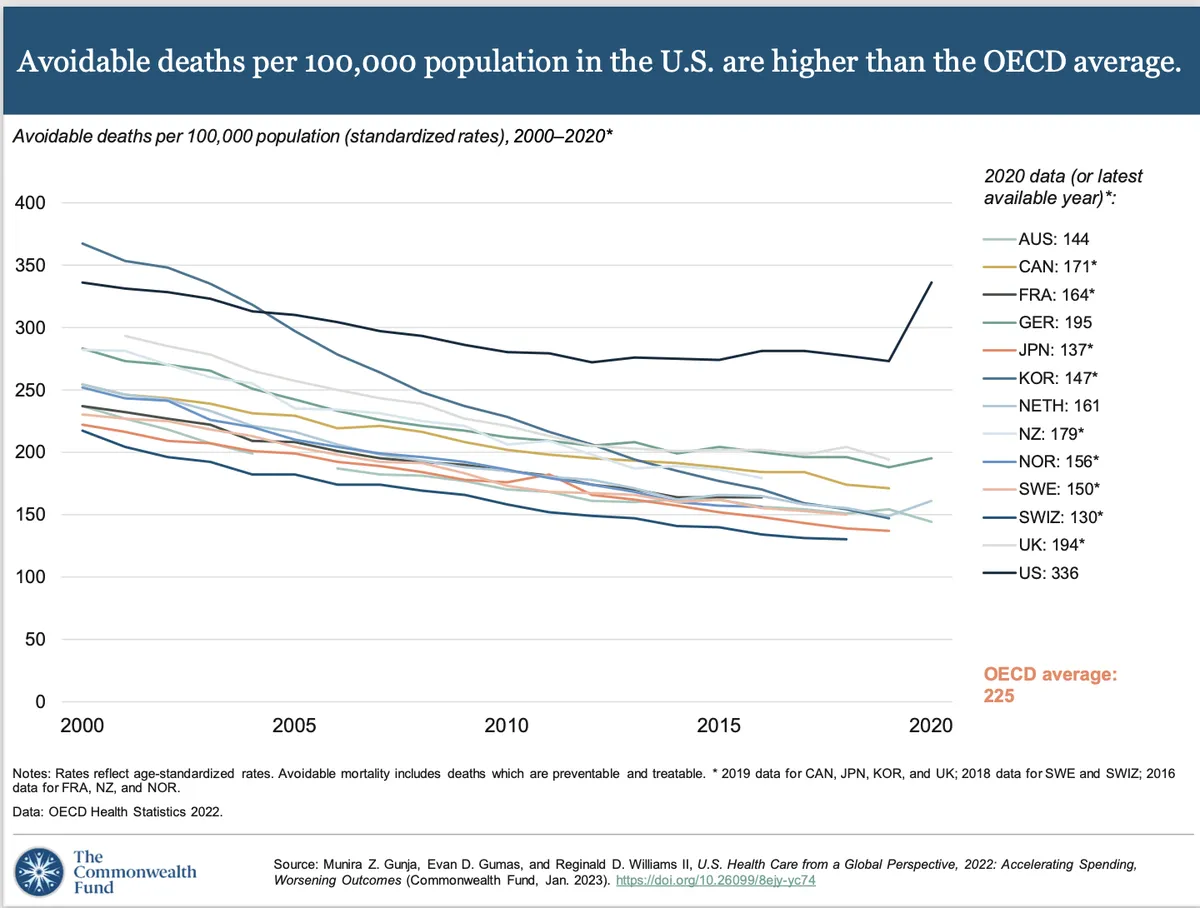 Source: The Commonwealth Fund
Source: The Commonwealth Fund
Life Expectancy
Life expectancy is declining for the first time in U.S. history. Decades of progress in medical research and public health have been wiped out, driven by the rise of preventable chronic diseases.
The U.S. now has the highest rates of both infant and maternal mortality among the 38 high-income countries of the OECD — 31% higher than the OECD average for infant mortality (per 1,000 live births) and 142% higher for maternal mortality (per 100,000 live births). These alarming statistics should outrage you, disturb you, and demand your attention.
Healthcare Spending
The U.S. spends nearly 20% of its annual GDP on healthcare — an unfathomable $4.3 trillion — far more than any other nation on Earth. Yet, instead of producing better health outcomes, this staggering expenditure fuels a system that leaves us sicker, fatter, and dying younger. Chronic illnesses — most of which are preventable and all of which are reversible — now consumes roughly 90% of all healthcare spending, a colossal waste of resources that achieves the opposite of its intent. What was meant to heal us now exploits us, prioritizing profit over prevention, and turning a public good into a national disgrace. This isn’t inefficiency; it’s a catastrophic failure, paid for by the health, trust, and well-being of every man, woman, and child in America.
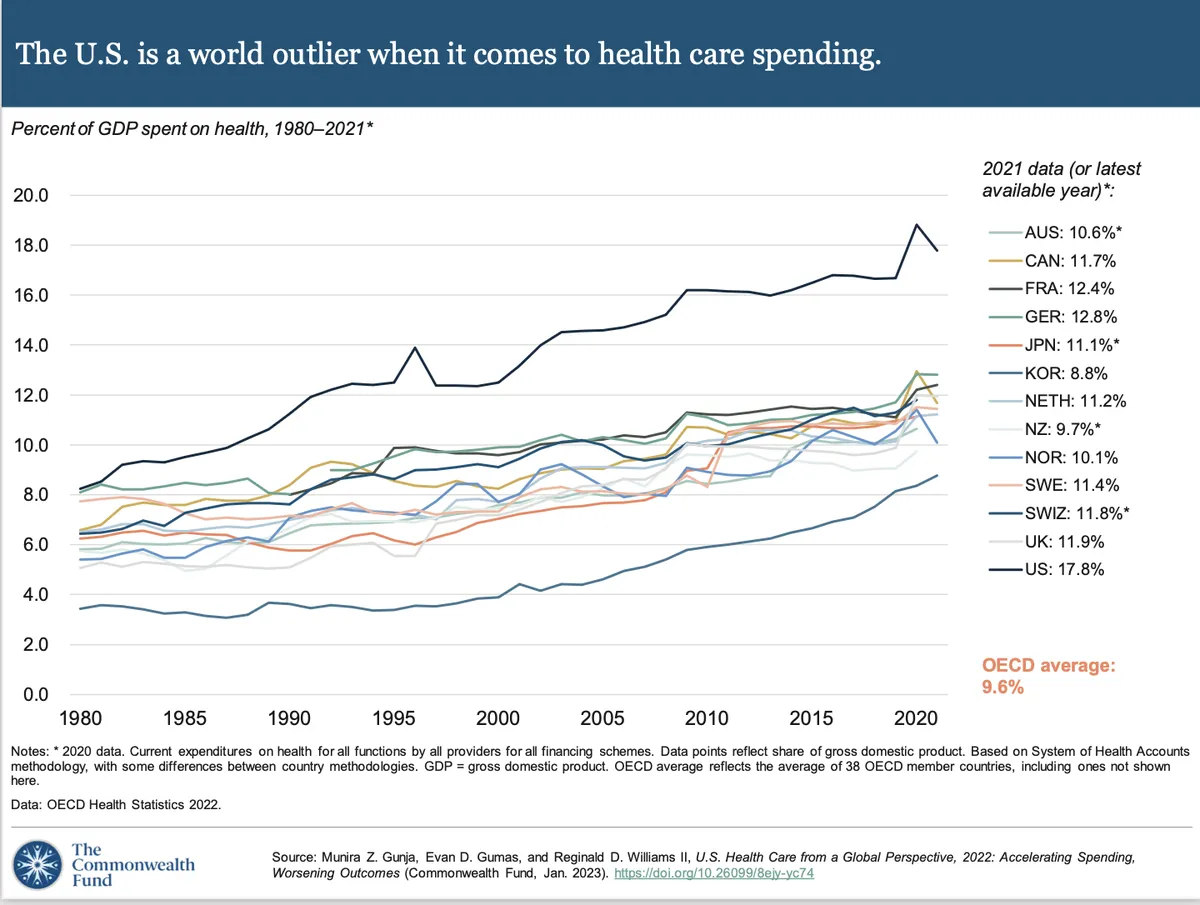 Source: The Commonwealth Fund
Source: The Commonwealth Fund
Part II: The Great American Lie — How Modern Food & the Business of Sickness Are Destroying Our Health
America’s health crisis is fueled by a powerful trio of industries — Big Food, Big Pharma, and the American healthcare system — all prioritizing profit over public health. Together, they perpetuate a vicious cycle of illness and systemic failure. What we eat hasn’t merely made us fatter and sicker; it’s eroded the very foundations of our physical and mental well-being — and this isn’t mere speculation; it’s grounded in science.
Chronic diseases have skyrocketed 200% since the 1970s. Nearly 93% of Americans now exhibit at least one marker of metabolic dysfunction — a precursor to disease. The toll isn't limited to just our physical health. Metabolic dysfunction is also linked to an epidemic of mental health disorders, including anxiety, depression, and ADHD. People with diabetes, for instance, are two to three times more likely to develop major depression and three times more likely to develop bipolar disorder.
The impact on our children is especially alarming. One in four American children now has prediabetes; rates of childhood cancer have skyrocketed to unprecedented levels. These disturbing trends trace directly back to the foods we feed our children — foods marketed as convenient and harmless but that are, in fact, slowly poisoning them.
The Economics of Sickness
At the heart of this crisis is an economy that thrives on sickness. Big Food profits from selling cheap, addictive, processed foods packed with sugar, high-fructose corn syrup (HFCS), and inflammatory oils. Once we’re hooked and sickened, Big Pharma and American healthcare — more accurately, American “sick care” — steps in to profit further by offering costly treatments that address symptoms, but rarely the root causes.
The U.S. spends a stunning 97% of its healthcare budget on treatment, while investing only 3% on prevention. At the same time, 57% of the average American's daily caloric intake is derived from ultra-processed foods — products designed for profit, not health. These cheap, high-margin junk foods flood grocery shelves, leaving fresh, unprocessed fruits and vegetables in the background.
Consider the Impact of U.S. Government Crop Subsidies
Since 1995, our government has allocated over $116 billion to subsidize corn alone and an additional $48 billion to subsidize soybeans and wheat. Crop subsidies aren't feeding families — they're fueling profits and feeding industries.
Moreover, crop subsidies promote monocropping, deplete vital soil, and fuel the use of harmful pesticides and additives in our food supply. This leads to the toxic accumulation of cancer-causing chemicals in our bodies, with 80% of Americans showing detectable levels of glyphosate (a known carcinogen) and nearly 92% carrying detectable phthalates in their urine.
Think about this: Less than 1% of corn grown in America is consumed fresh; the rest is processed into high fructose corn syrup, livestock feed, and ethanol.
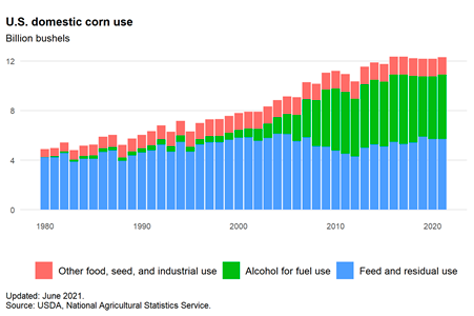
The Scourge of Seed and Vegetable Oils
These seed and vegetable oils provide one of the starkest examples of how far we've strayed from nature's blueprint. These oils dominate the American food supply for one reason and one reason only: subsidized corn and soybeans are cheaper for manufacturers to produce than healthier oils like olive oil or avocado oil — American health be dammed! This eye-opening X thread on the negative impact of vegetable oils on human health and Jeff Nobbs' excellent article, Death by Vegetable Oil, are powerful reminders of what's at stake.
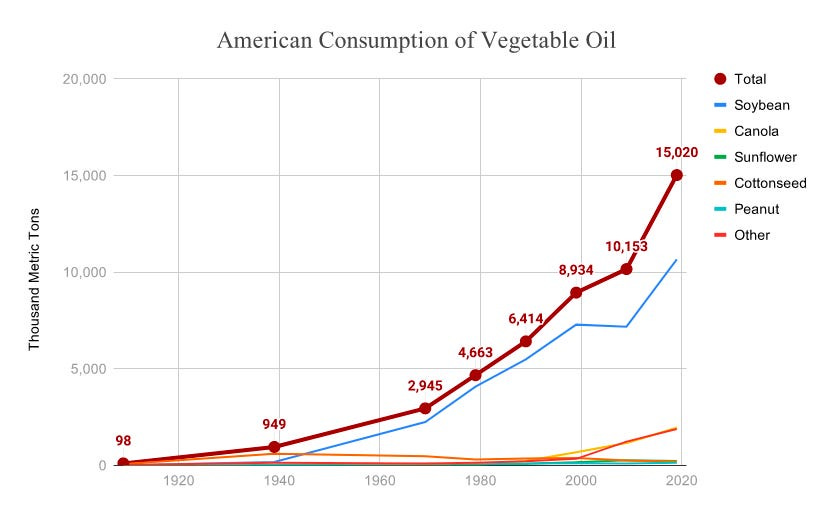 (source)
(source)
Seed and vegetable oils now comprise roughly 20% of the average American's daily calories, yet just a few hundred years ago, they didn't exist. Why? Because they were impossible to produce. Nature doesn't create harmful fats. Only humans do.
Our bodies were honed over millions of years by evolution to maintain a delicate, homeostatic balance. By introducing these novel, highly processed fats, we have disrupted that balance, fueling chronic inflammation and undermining the body’s ability to regulate itself. Now, these cheap, pervasive oils saturate nearly every corner of the modern diet, from snack foods to restaurant meals, their rise mirroring the surge in chronic diseases — heart disease, obesity, and inflammatory disorders — that increasingly define and plague modern life.
The prevalence of harmful oils is just one symptom of a far deeper, systemic crisis. Nutrient-dense, whole foods have been replaced by industrial, profit-driven substitutes. Processed foods, sugary drinks, and chemical additives now dominate our diets, crowding out the nourishing staples that once sustained us. This shift wasn't accidental—it was engineered, incentivized, and marketed relentlessly. By sacrificing evolutionary wisdom for industrial convenience, we've unleashed a wave of chronic pain and disease that’s increasingly difficult to undo. Yet undo it, we must.
Reccurring Betrayal: Again and Again Over and Over
One of the great ironies of this catastrophe is that Americans pay the price AGAIN and AGAIN and AGAIN. First, our tax dollars subsidize the very crops that fuel chronic disease. Then, we pay a second, third, and fourth time through soaring healthcare costs, deteriorating health, and prematurely shorter lives. It should infuriate every one of us that more U.S. taxpayer dollars are spent to subsidize cancer-causing Big Tobacco than healthy fruits and vegetables, which make up less than 0.5% of federal crop support.
That we financially support and prop up the very systems that are destroying our health while lining the pockets of powerful corporations is a pitiful irony, an economic failure, and one of the most horrific betrayals of the American people on record.
Perhaps the most damning aspect of this crisis is that this is a uniquely American failure. Much of what I've described here doesn’t happen in Europe, where food safety is prioritized, harmful additives like high fructose corn syrup are banned, and public health trumps corporate profit. Take Heinz ketchup, for example: the U.S. version is packed with high fructose corn syrup, while the EU version contains simple, recognizable ingredients. The difference? Ruinously bad incentives.
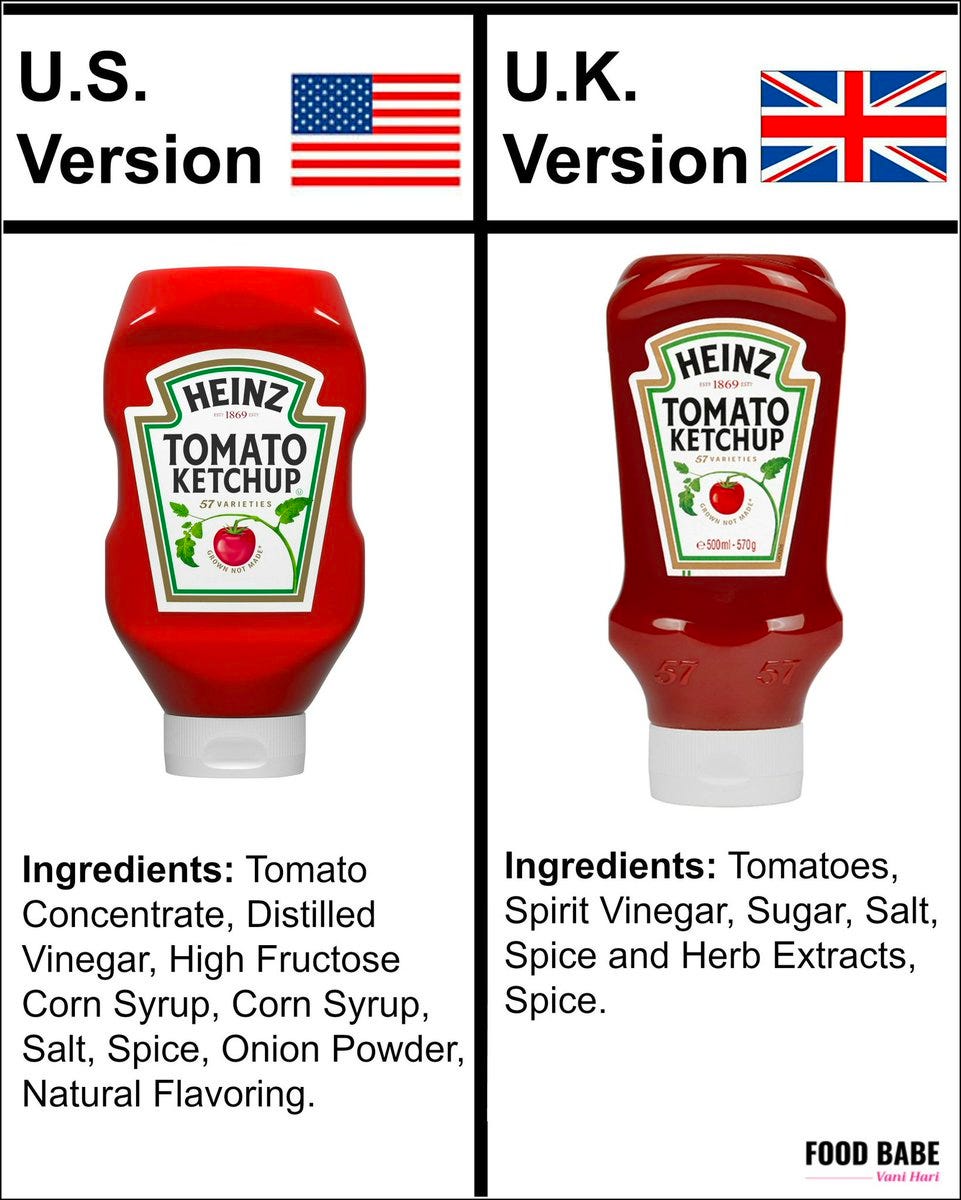
America’s food and healthcare systems aren’t just failing us—they’re actively shortening lives and destroying futures. The real cost isn’t measured in dollars and cents, but in sick children, broken families, and a rising tide of preventable disease. The question isn’t whether we can afford to fix this (we can). It’s whether we can afford to ignore it any longer (we cannot). Will we continue to bankroll our own demise, or will we finally demand the change we deserve before it’s too late?
How Big Food and Big Pharma Profit from Sickness
For every $1 the NIH spends on nutrition research, the Big Food lobby spends $11 to muddy the waters, influencing everything from government policy, dietary guidelines, and medical recommendations. This is the result of a deliberate strategy by Big Food and Big Pharma to profit from sickness, not wellness. The goal is to poison and profit, not nourish and heal.
Big Food spends billions to shape public perception, policymaking, and even science itself. Consider the Tufts Food Compass, an NIH-funded initiative that claims Lucky Charms is healthier than whole milk, beef or a baked potato. Nearly 70 brand-name cereals from Post, Kellogg’s, and General Mills outrank eggs, ground beef, and whole wheat toast as “healthier” options. These aren't innocent mistakes. Studies like these are carefully crafted to promote processed foods over real, whole foods.
To make matters worse, school systems rely on these same flawed studies to determine what's served to our children in schools. The results are devastating:
- A Congressional declaration that pizza a vegetable;
- 80% of U.S. public schools have contracts with soda companies;
- School lunches empirically linked to higher rates of obesity for kids; and
- 87% of school cafeterias serve Big Food items from McDonald’s, Snickers, and Coca-Cola.
Instead of nourishing the next generation, we've handed them over to Big Food's profit machine. And, this influence doesn't stop at schools. A shocking 80% of doctors graduate without any formal nutrition training. As a result, most doctors rely on industry-funded research to guide their advice, creating a vicious cycle:
- First, Big Food funds studies that validate processed foods.
- Then, these studies shape dietary guidelines and medical curricula.
- Then, doctors, armed with flawed information, advise patients accordingly.
- Then, chronic illness increases, driving demand for expensive medications and treatments.
What might initially seem like either poor science or a terrible mistake is actually a multi-billion-dollar business model. Even taxpayer-funded programs like SNAP are complicit in the problem. Seventy-five percent of SNAP allocations are spent on ultra-processed foods, while healthier options are often out of reach. In 2016, Americans spent $7 billion in SNAP funds on sugary drinks—accounting for 20% of Coca-Cola’s annual U.S. revenue.
Big Food and Big Pharma thrive by making health seem complicated. Conflicting messages flood consumers, who turn to "experts" incentivized to prescribe medications and treatments that manage symptoms, rather than tackle the root causes.
The outcome? The average American will take 17.6 medications over their lifetime, fueling a $4 trillion healthcare industry that profits from managing illness instead of curing it.
Part III: The Power of Root Cause Medicine — The Case for Functional Health
We've been taught to view our health as a series of isolated problems — a prescription to lower cholesterol here, a suggestion to shed a few pounds there. But what if this fragmented approach is all wrong? What if, instead of seeing the body as a collection of disconnected parts, we understood it as a complex, interconnected ecosystem? This is the fundamental premise of Functional Health, a powerful paradigm that shifts the focus from treating symptoms to uncovering and addressing the root causes of disease.
Functional Health — far beyond just treating disease and illness — recognizes that physical, mental, and emotional health are not separate entities, but rather parts of a holistically intertwined whole. Unlike the traditional medical model, which addresses disease in isolation — prescribing one treatment for a symptom and another for a different complaint — Functional Health asks why these health issues are arising in the first place. Persistent fatigue, for instance, isn't merely a side effect of sleepless nights — it could be linked to blood sugar imbalances, gut dysfunction, or chronic inflammation.
This idea has been championed with great success by medical pioneers like Dr. Mark Hyman, who describes Functional Health as the "science of creating health rather than simply managing disease." Functional Health practitioners understand that conventional medicine isn't plagued by the absence of care, but rather its narrow scope, poor incentives, and often misaligned interests. While our healthcare system excels at handling acute conditions and emergency situations, it fails when it comes to preventing or addressing chronic illnesses — health challenges that are often avoidable or reversible by shifting our focus to foundational health practices.
Over the last decade, Functional Health has slowly made its way into our communities, with healthcare practitioners like my local pharmacist offering an enlightened approach to health. Unlike the big pharmacy chain stores, my local pharmacy isn't a candy store and Hallmark card shop that just happens to also fill medication prescriptions. They work hard to equip their customers with knowledge about how food, movement, stress management, and smart supplementation can transform their health. Shout out to Burgios Pharmacy. This refreshing shift from the standard, one-size-fits-all approach proves that real, sustainable health change doesn't require waiting for the next miracle drug — it starts with the decisions we make in our local communities and daily lives.
Good Energy: The Systemic Perspective
This shift in perspective reflects a larger, systemic issue, one that Dr. Casey Means very effectively explores in her groundbreaking new book — Good Energy: The Surprising Connection Between Glucose, Metabolism, and Limitless Health (2024).
Means, a Stanford trained doctor, opens Good Energy with an unapologetic charge that the very systems we rely on for health are built to keep us sick, ensuring a steady stream of profits for Big Food and Big Pharma. She argues that these industries aren't just misguided and inefficient, but also that they are structurally designed to perpetuate illness, offering only temporary fixes rather than real, lasting solutions. Her research reveals how deeply embedded this cycle of sickness is.
Good Energy shattered any remaining illusions I had about the benevolent intentions of the food, healthcare, and pharmaceutical industries. It was a wake-up call for me — and I hope it can be for you too. Far more than just exposing systemic failures and corporate greed, Means also offers a clear, practical roadmap for reclaiming our health. From understanding lab and blood test results to navigating conversations with doctors and making smarter food choices, Good Energy is packed with actionable advice. Beyond the book, Means' website provides even more valuable resources, including free downloadable tools, shopping lists, and discounted access to cutting-edge HealthTech startups pushing for real change.
Part IV: Reclaiming Our Health — Realigning Incentives, Eight Foundational Principles of Health & the FELTS Framework
When humans stray too far from the environments that shaped our evolution, disease and dysfunction take root. We were designed to thrive in harmony with the rhythms of nature, but modern life has pushed us far from those origins. While returning to a hunter-gatherer existence is neither possible nor practical, we must reimagine our world to align with the biology that defines us — working with it, not against it. Our health, our resilience, and our future depend on it.
Realigning Incentives
Reclaiming our health begins with reshaping societal systems and priorities to align with our biology rather than working against it:
- Transparent Food Labeling: we must demand clear, honest, easy to understand information about the contents and impacts of the food we eat.
- Public Education: we must equip parents, teachers, community leaders, and everyday citizens with knowledge about the fundamental principles of health, starting in schools.
- Tax Incentives for Healthier Options: we must start rewarding companies that produce minimally processed foods and penalizing those that use harmful additives and seed oils.
- Subsidize Real Food: we must redirect crop subsidies away from monocropped corn, soy, and wheat to support regenerative farming practices that grow nutrient-dense fruits, vegetables, and proteins.
Closing the gap between our modern environment and our evolutionary needs has become an imperative we can no longer afford to ignore or pass on to the next generation. The time is now. We need to use the wisdom from the past to address and correct the mistakes of the present. Real food, clean air, natural movement, and human connection have, and always will be, at the center of a healthy society. Our task is to rediscover them.
Eight Foundational Principles of Human Health
At the core of human health are eight foundational principles — simple, indispensable truths. Ignore them, and the cost is disease, suffering, and shorter lives. Our health — and just as importantly, our lives — depend on it.
- #1 Avoid toxins: Minimizing exposure to environmental pollutants and harmful chemicals.
- #2 Hydration: Drinking adequate amounts of water daily supports nearly every bodily function.
- #3 Soak up sunlight (safely): Sunlight is essential for vitamin D production; exposure to natural light supports circadian rhythm regulation.
- #4 Move your body regularly: Sedentary lifestyles are strongly associated with chronic diseases. Remember: sedentary is the new smoking
- #5 Manage stress: Chronic stress has a profound impact on health, including increased risks of cardiovascular disease, immune dysfunction, and mental health issues.
- #6 Sleep well and prioritize rest: Strongly supported by research; quality and quantity of sleep affect almost every system in the body, from immune function to mental health and metabolism.
- #7 Community and connection: Social health is an overlooked but crucial element of well-being; studies show that strong social bonds and a sense of belonging can extend lifespan and improve quality of life significantly.
- #8 Eat real, unprocessed, nutrient-dense foods: Strongly supported by research; diets based on whole, unprocessed foods are linked to reduced chronic disease risks and improved overall health; nutrient-dense foods (e.g., fruits, vegetables, lean proteins) align with evolutionary eating patterns.
The FELTS Framework: Five Pillars for Better Health
Health isn’t as complicated as the food companies and related industries want us to believe. By just focusing on food, exercise, light exposure, toxin reduction, and sleep we can restore our bodies to the state they were designed to thrive in and reclaim our health from a system actively working against it. Introducing the FELTS framework:
F🟰Food
Eat Real Food. Focus on natural, whole foods your body recognizes: seasonal, organic, and minimally processed. Steer clear of the "big three" industrial crops: corn, soy, and wheat. These crops are not only heavily processed but also laden with harmful pesticides and stripped of nutrients.
- Fresh, nutrient-dense foods reduce inflammation and support optimal health.
- Prioritize seasonal, organic, and minimally processed foods; our bodies are designed for them.
- Ultra-processed foods account for nearly 60% of the average American’s diet and are directly linked to rising rates of obesity, cancer, chronic disease and inflammation.
E🟰Exercise
Movement is Medicine. Arbitrary metrics like "10,000 steps a day" are nonsense. What matters is regular and purposeful movement of your body daily. We evolved for dynamic, functional movement, not for hours of sitting or scrolling. Movement isn't just about burning calories; it's a cornerstone of physical and mental health.
- Aim for at least 150 minutes, of activity weekly spread across four to six days.
- Engage in a mix of activities such as walking, strength training, stretching, and anything you enjoy.
- Movement supports everything from cardiovascular health to anxiety reduction, making it as close to a miracle drug as we'll ever have.
L🟰Light Exposure
The Sun is Your Ally. Light is a silent but powerful regulator of human health. Your circadian rhythm — the human body's internal clock controlling sleep, metabolism, and even mood — depends on natural light exposure. Modern life, with its artificial lighting and screen addiction, significantly disrupts this balance.
- Avoid blue light at night, which disrupts sleep and metabolism.
- Get morning sunlight daily. Natural morning light helps set your circadian clock and regulates hormones like cortisol and melatonin.
- Embrace sunlight in moderation. The myth that sunlight is inherently harmful ignores its essential role in vitamin D production and overall health. Use timing, shade, and protective clothing rather than relying solely on sunscreens, which can be harmful to human health and marine ecosystems.
T🟰Toxin Reduction
Minimize Synthetic Threats. We're living in an era of unprecedented exposure to egregiously harmful synthetic chemicals. Everyday products like clothing, furniture, food packaging, and even water are rife with toxins like phthalates, PFAS ("forever chemicals"), and pesticides. These toxins disrupt hormones, increase inflammation, and are a primary contributor to chronic disease.
- 97% of Americans carry PFAS in their blood, linked to cancer and neurological disorders.
- 92% of Americans have detectable levels of phthalates, linked to testosterone declines and reproductive issues.
- Glyphosate, a pesticide widely used in the U.S., is linked to cancer despite being banned in over 30 countries.
S🟰Sleep
Sleep is the Cornerstone of Good Health. Sleep is the most overlooked yet arguably the most important pillar of human health. Quality sleep regulates hormones, supports mental clarity, and allows your body to repair itself. Modern habits — artificial light, late-night eating, and irregular schedules — work counter to these restorative processes. When sleep is optimized, everything else — mood, energy, and physical health — follows suit.
- Manage stress through mindfulness or relaxation practices. Anxiety is a common barrier to restful sleep.
- Prioritize consistency. Going to bed and waking up at the same time each day dramatically strengthens your circadian rhythm.
- Align your sleep with natural rhythms by exposing yourself to morning sunlight and avoiding screens at least ninety minutes before bed.
The FELTS Framework is a practical, research-backed blueprint for reclaiming your health. By focusing on food, exercise, light exposure, toxin reduction, and sleep you can create a sustainable foundation for lasting well-being, no matter how chaotic modern life gets.
Part V: A Turning Point and A Call to Action
Now, A Little Secret
I never set out to be a healthy lifestyle advocate, and I certainly never imagined I’d be writing about it. Like many of you, I found myself boxed out by a food system and healthcare industry that profits from our illnesses while disregarding our well-being.
In fact, I’m probably the last person who should be writing this. I’m not a doctor, nutritionist, or medical researcher. I’m a recent former smoker, someone who only just started exercising again after years of neglect. I don’t drink alcohol, smoke marijuana, or use drugs, but I humbly admit to being addicted to Coca-Cola. Lame, I know. I have terrible sleep habits and also take multiple medications for some of the very metabolic conditions discussed here. Over the past decade, I’ve battled a crippling case of chronic Lyme Disease that left many lasting scars on my health. Despite knowing what constitutes a healthy diet, I don’t always stick to it — convenience often wins. In short, I’m no health guru.
I am writing this because I’m furious—and you should be, too. The more I learn about the systemic exploitation and corporate greed driving our health crisis, the more determined I am to reclaim my health and hold those responsible to account.
Change, of course, is not easy. But, it doesn’t require perfection. It doesn’t demand expertise. It only requires curiosity, a desire to feel better, and the courage to start small and keep going. I’m writing this piece not because I have it all figured out, but because I suspect many of you are in the same boat. Please trust me when I say that if I can do this, so can you.
The Truth They Don’t Want Us to See
The American healthcare system is exceptional at handling emergencies and acute care. But when it comes to chronic diseases, it has failed us spectacularly. Medications for high blood pressure, high cholesterol, diabetes, and the like are prescribed under the guise of "managing" conditions that are often attributed to bad luck or faulty genes. This isn't true. They're lying to you. These illnesses aren’t random. They are the direct result of what we eat and how we live. By the time you’re handed a prescription for one of these conditions, you’re already sick. These medications aren't designed to heal you of your chronic condition, they're simply designed to help you manage it. Don't believe me? Ask your doctor when you can go off that medication and you'll have your answer. By definition, a diagnosis of chronic metabolic disease is not just a label — it’s confirmation that a slow, painful journey toward a shorter life, relentless symptoms, and skyrocketing costs has already begun.
The devastating twist, as discussed, is that most chronic diseases are preventable, many are even reversible, but only if we address their root causes. But instead of empowering us, they hand us a pill and a story that keeps us dependent, while Big Food and Big Pharma laugh all the way to the bank.
Unprecedented Health Crises, Unparalleled Corporate Greed
Chronic illnesses now affect more than one in three Americans. Over 131 million of us take prescription medications, including over half of all adults under 50. These aren’t just statistics; they’re human lives, marked by suffering that is largely avoidable. And yet, the industries responsible for this crisis — food manufacturers, pharmaceutical companies, even parts of our medical establishment — operate with ruthless efficiency, pushing profits at the expense of public health.
Much like Big Tobacco, they know their products harm us. They know their marketing deceives us. They know the longer we stay sick, the more money they make. And they don’t care. They profit from our confusion, our illnesses, and our dependency.
The time has come for us to respond.
Part VI: This Ones On Us
If there's one thing I hope you take from this piece, it's that your health is in your hands. It’s tempting to point fingers at corporations and policy failures. They no doubt deserve it. But, this one's on us. What we put on our plates, how we move our bodies, and how we prioritize rest, matters. A lot. These are decisions that shape lives. Waiting for institutions to change won’t save you.
We don’t need another miracle drug or groundbreaking discovery. We need action. Personal accountability. The willingness to disrupt old habits. Forget about perfection, making grand gestures, or chasing unattainable ideals. Just make progress.
This isn't just a personal challenge — it’s a societal one. Start small. Ask yourself: What’s one thing I can do better today? Not with guilt, but with curiosity. The solutions are stunningly simple: eat real food, move more, sleep better, and connect deeply. Small, consistent steps will compound over time, transforming not just your health, but the world around you.
It may be true that the stakes couldn't be higher, but it's also true that the rewards couldn't be sweeter.
Treat your health like the gift it is.
